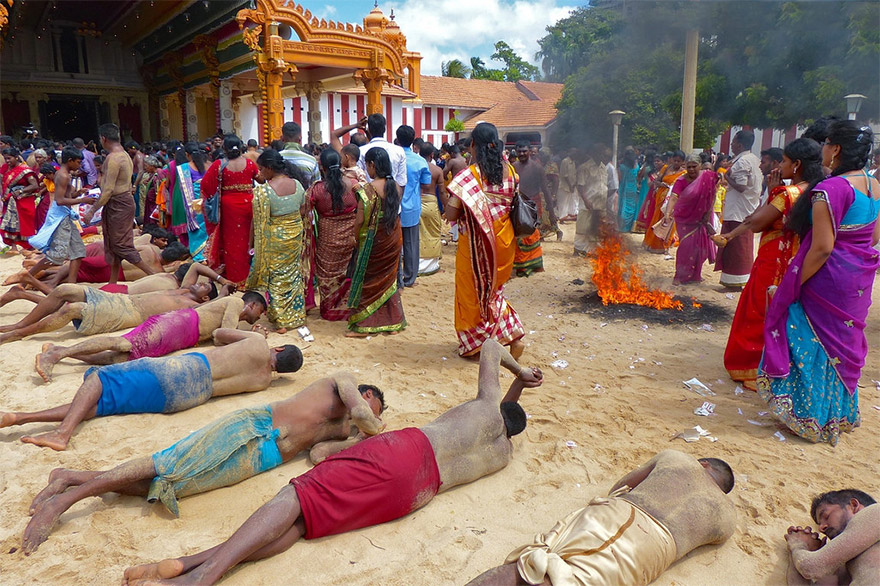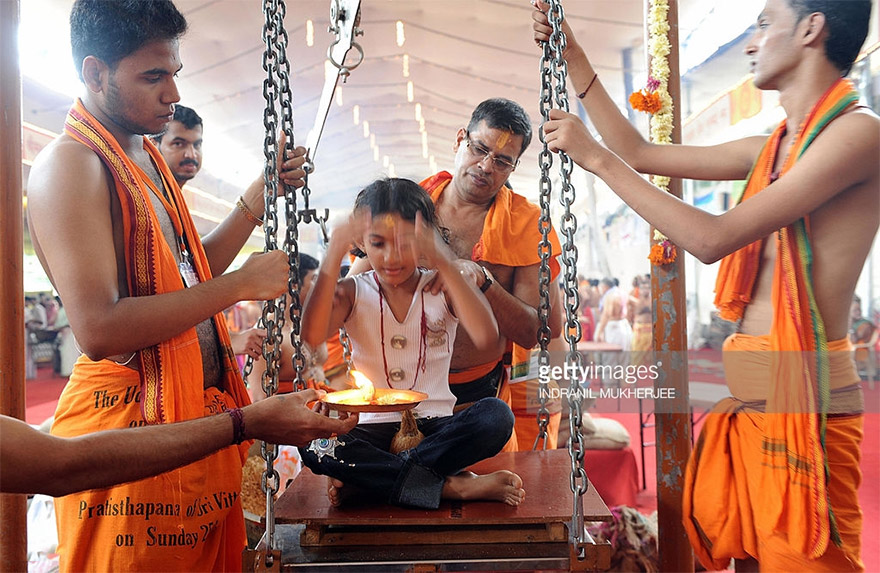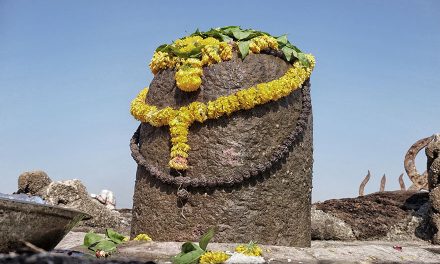The following are some of the common offerings by devotees visiting Tirupati Balaji temple at Tirumalai.
Tonsuring (shaving one’s head)
The objective behind tonsuring (shaving one’s head for the Lord) is to demonstrate that he/she completely surrenders his/her ego at the feet of the Lord. Pilgrims can have their heads tonsured at the Kalyanakatta (opposite the Annanadanam Complex). There are seventeen sub-centers for tonsuring. Pilgrims can also request to be tonsured at the cottages where they are staying.
Walking up the Hills
Many pilgrims walk up the hills to fulfill vows they have taken, for which Tirumala – Tirupati Devsthanam has constructed a footpath from Alipiri to Tirumala. It takes approximately two and a half hours to walk up the mountain.
[wp_ad_camp_1]
Angapradakshinam
Angapradakshinam is when pilgrims lie prostrate, and then roll around the temple, chanting the Lord’s name. The objective is to show their devotion to the Lord, and thank Him for protecting them. It is performed in the Vimana Pradakshinam, one of the pathways around the temple.
Pilgrims who wish to undertake the Angapradakshinam have to take a dip in the Swami Pushkarini, and reach the Main Temple Complex by 0200 hrs (through a special queue that starts from the PPC Sheds).
Angapradakshinam is generally restricted to the weekends (Saturdays and Sundays). It is also restricted when there is heavy in flux of pilgrims.
Tulabharam
Tulabharam is offering one’s weight in coins or other items such as sugar, candy according to one’s vows to the Lord. Tulabharam is generally performed for children. Pilgrims can weigh their offerings in the temple complex. The coins can be deposited in the temple hundi and other items can be handed over to the temple authorities present.
The queue for Tulabharam is the regular queue that starts from the Vaikuntham Queue Complex or PC Queue Complex.
Niluvudopidi
Niluvudopidi is offering to the Lord the ornaments, etc., that one is wearing when one takes the vow. The objective is to sacrifice one’s belongings to the Lord, with the philosophy “what is mine is the Lord’s”.















very good
Highly Informative
Very good though we know it it gives a satisfaction to read again and again anything about LORD VENKATESHWARA.
AUM NAMOO VENTAKESHAYA NAMAHA
Interesting and educative information for any devotee and pilgrim who endeavours a pilgrimage to Balaji darshan. It also helps improve our general knowledge. Happy journey and happy pilgrimage to all.
Well informative to the public,especially,who living away from India
Thanks very much,
this is the great and good web site witch i never seen, its really good
Informations are appreciable
It really very good informatic. I am visiting Tirupati once in a year. And I always remember my parents for given me such as good direction of life.
Thanks
Venkatesh
People in India do not know that Buddhism is the third largest religion in Europe after Christianity and Islam. I have recently converted to Shiva-Buddhism after disoluusionment with Christians and Buddhists who do not practice their faiths properly. Bhagavan Buddha encouraged lay persons to continue their pujas to the devas, but not bali of course, and I find traditional Indian puja very interesting.
Thanks for sharing this information. I have learnt something today. Now I can understand the reasons behind the pilgrims austerities and appreciated their devotion.
Oh my goodness. I am always inspired by Indians’ level of devotion to God. The vow that strikes me the most in this article is angapradakshinam. Dear Brahma, may I reach the level of devotion for Thee that these dear souls have. Om.
All the information along with the very basic understanding about the devotion is well explained. It is also a fact that many pilgrims just do it without knowing any Importance and or just for fashion sake. During Angapradakshina few people get bruised and TTD authorities doesn’t offer any medical treatments. Bhargavaram